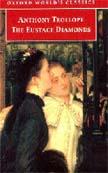
A number of literary thinkers disapprove of the current state of American society, but I have yet to discover a writer who can satirize the early 21st century with the same style and finesse as Anthony Trollope did Victorian England. Anthony Trollope was an amazingly prolific writer, producing over 50 books over the course of his lifetime, most of them criticizing the injustices, hypocrisies, and ills of his time.
The Eustace Diamonds is simultaneously a scathing attack on Victorian social mores and an entertaining defense of traditional morality.
The Eustace Diamonds revolves around the machinations of the gold-digging Lizzie Greystock. Lizzie is beautiful but bankrupt, and she utilizes her charms to snare the ailing nobleman Sir Florian Eustace.
When her husband dies several months later of natural causes, Lizzie is left with an infant son, a considerable income, and a fabulous diamond necklace, without which there would be no story.
The diamond necklace has been passed down in the Eustace family for generations, and Sir Florian only gave Lizzie the necklace temporarily to wear for special occasions. Trollope makes this point very clear, and he reminds the reader of this fact about every other chapter.
Lizzie knows full well that by rights she should return the necklace — worth about 10 thousand pounds — to the Eustace family, but she doesn’t want to.
Therefore, Lizzie creates the fiction that Sir Florian gave the necklace to her to keep. This is a complete and utter lie, which Trollope reminds the reader about twice a chapter.
That’s when the fun begins. Even though Sir Florian’s younger brother is so obscenely wealthy that he can afford not to pursue the matter, the family solicitor loathes the scheming Lizzie so much that he commences an expensive legal battle in order to reclaim the diamonds.
Lizzie hires her own legal counsel, and the scenes between the upright Eustace lawyers and Lizzie’s slimy band of crooks are a hoot. I refuse to spoil the plot, but a band of society gossips, professional sneak thieves, and adventurers out for Lizzie’s hand all join in on the three-ring circus.
Lizzie tries to present herself as the victim of her greedy in-laws, and her ersatz, demure manner wins her many friends in English high society, many of whom are even shallower than Lizzie. Meanwhile, Lizzie attempts to disrupt the courtships of decent couples in order to further her own position. It’s not until many months of litigation have passed that Lizzie’s lies and half-truths start to overtake her.
The necklace is really only a MacGuffin, a term coined by Alfred Hitchcock in reference to an object that drives the plot of a story, but which is in reality irrelevant and replaceable (any other object would produce a similar effect). Trollope sheds a negative light on those individuals who put appearances over character, substitute prejudices for principles, and abandon what is right for what is easy. But this is certainly not a preachy, moralistic novel. In The Eustace Diamonds, virtue is not necessarily rewarded and vice punished.
Trollope seeks to recreate his world, without shaping it to his idealized vision of how society should be.
